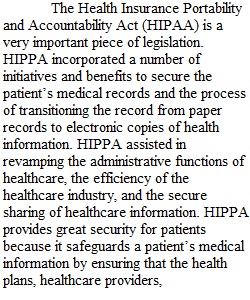


Q • Weight: 12% of course grade • Grading Rubric Instructions Podcast In this assignment, you are the new emergency services division training officer. One of your goals is to make sure you reinforce paramedic/firefighters’ understanding of the legality of texting patient information. Recently, during patient transports, paramedic/firefighters began using texting to transmit the patient’s name, chief complaint, vital signs, and symptoms using OPQRST (an acronym used by medical professionals to accurately discern reasons for a patient’s symptoms and history in the event of an acute illness) to the receiving hospital instead of doing a radio report. This has become an easy way to relay information and captured images of the patient quickly to allow the nurses to begin patient care reports and understand the extent of the patient’s condition. You understand, while this may seem harmless, it is potentially placing the patient’s data in the hands of cyber criminals or anyone else who could see the text on the phone or even gain access to this information if you make a mistake tapping the wrong name on your contacts. You are considering a traditional in-service training program relying on field training officers to bring their knowledge and experience to the training; however, you realize that this could lack consistency because of the number of stations, different shifts, and personnel, so you decide to create a podcast that could be reviewed during their downtime. You will create a short podcast episode. The podcast should address the questions below regarding the Health Insurance Portability and Accountability Act of 1996 (HIPAA) based on the information provided. You will need a written transcript addressing the requirements set forth above. Podcasting can be used as an effective educational tool when communicating with your personnel. Many individuals enjoy listening to their favorite podcasts while commuting to work or even while completing household chores. Podcasting allows training officers to broadcast engaging audio content that firefighters can listen to at any time and wherever they are. While a podcast is shorter and more informal than a lecture, keep in mind the use of technology must not overshadow the message. Within your podcast, include the following: ? a brief introduction of yourself and your agency, ? a brief summary of the importance of HIPAA, ? an explanation of who must comply with HIPAA, ? an explanation of what health information is subject to HIPAA compliance and is protected, ? an explanation of the legality of noncompliance with HIPAA by texting patient information even to a nurse or medical facility, ? a conclusion that includes a brief overview. Your audio podcast should be a minimum of 3 and a maximum of 5 minutes. You may record your podcast using any tool or software that produces a standard audio file, such as an .mp3 file. You will insert your audio file into a Word document and then add a clear transcript of your podcast. The transcript is simply a written version of your audio podcast. You may find it helpful to draft the transcript first and then read it like a script while recording your podcast. For help, you can access Recording Audio and Inserting Into Word or Pages. Please include a cover page with your final submission. Citations and references are not required. Resources The following resource(s) may help you with this assignment. ? Citation Guide ? CSU Online Library Research Guide ? Submit Writing Center Request
View Related Questions